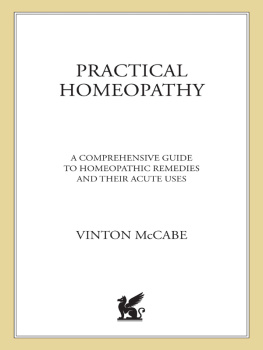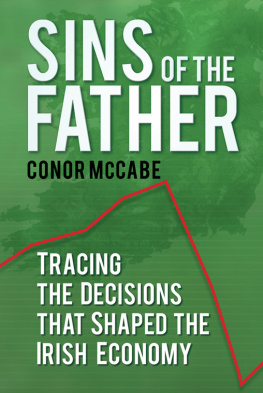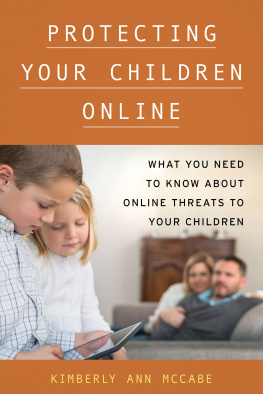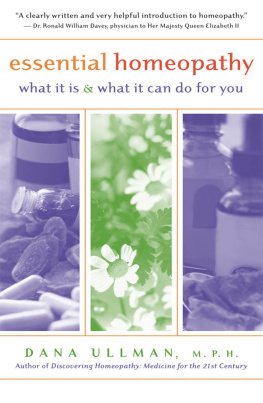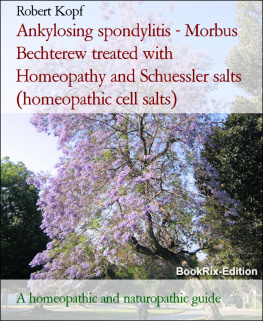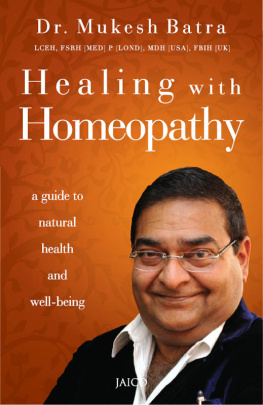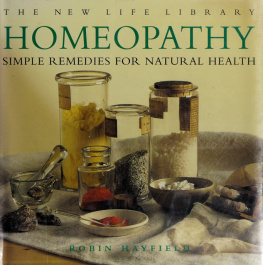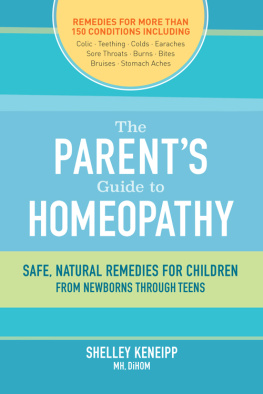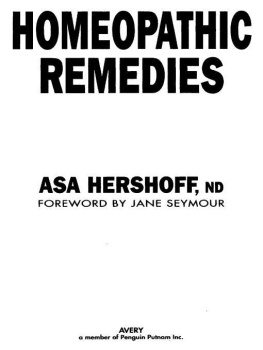The physicians highest and only calling is to make the sick healthy, to cure, as it is called.
Preface
Can Homeopathy Be Practical?
Lets get this over with right up front; homeopathy is an oddball sort of medicine, one that refuses to be easily categorized or explained. In fact, the word homeopathy seems to be used today in so many ways that if we are to believe its common misuse in magazines and newspapers and on television, it can mean anything that is natural, from herbal medicine to witchcraft. At its best, it seems to be a form of intuitive practice that was the brainchild of a disgruntled German physician, Samuel Hahnemann, who was quite literally driven from the practice of medicine because of his beliefs. Its a form of medicine that is based not in the science of the modern technological age but in the science of two centuries ago. At its worst, homeopathy seems to be some sort of cult, one largely populated by those lacking in the finances and willingness to take advantage of the full range of modern medical discoveries from antibiotics to cloningin other words, medical Luddites.
Homeopaths tend to be an odd breed of people as well. Often it seems that they do not play well with others. Most of those in the United States who practice homeopathy do so with medical degrees other than medical doctor. Often they are naturopaths, chiropractors, and other members of the medical fringe. The fact that in this country there is no legal or medical slot for homeopath may well have some bearing on this, but the complexities of medical law do not affect our understanding of homeopathy.
Given all the oddities of homeopaths and the homeopathic communityand these oddities as well as the failure of homeopaths to ever be able to gather in support of one another may well be largely responsible for the fact that homeopathy remains in most peoples minds an alternative therapy at bestand of homeopathy as well, we have to ask the basic question Is there any merit to homeopathy?
I can only answer from my experience that homeopathy worked for me when nothing else had, and it appeared that nothing ever would. Like many others, I turned to homeopathy only when there was nowhere else to turn. And I was blessed by walking into the right office. There I found a practitioner who believed that the healing process is also an educational process, and who taught me homeopathy while treating me homeopathically.
While it is true that homeopathy has its roots in ancient herbal medicine and in alchemy, this is the case for all medicine, although unlike the homeopaths the practitioners of modern medicine deny this historic truth. And it is further true that homeopathy owes as much to modern chemistry and physics as it does to ancient alchemy.
For nearly two decades now I have studied homeopathy and have written about it and taught it as well. The information presented in this book is the result of those years of study and research.
But the question of whether or not homeopathy could ever be thought of as being practical or not never really occurred to me until it was thrust on me in a classroom setting. Several years ago I was teaching a course in basic homeopathic philosophy in the way that I always do. I was telling the class that homeopathy is a form of energy healing, like acupuncture, and that also like acupuncture it brings a catalyst that allows your body to heal itself. I was explaining that from a homeopathic viewpoint we have to learn to honor our disease symptoms as something native to ourselves, as an outgrowth of self, and stop just trying to stamp them out, because any symptom that is ignored, that is stamped out, will only return again, stronger than before. I explained that we have to start dealing with the root causes of our illnesses and not with the symptoms alone.
I had spent the better part of the day going over all this, teaching how the homeopath matches the symptoms to the appropriate remedy, when a hand went up. A woman asked, Is any of this practical?
The question rather stunned me in that the issue of practicality never really seemed important to me one way or the other. But the question had been raised and therefore needed to be dealt with.
Is homeopathy practical? And can it ever be considered practical? I guess the answer is yesand no.
Homeopathy is based in the ancient notion of medicinethat is, medicine for the whole man. Allopathic medicinethat which would be considered Western Medicinehas taken a different evolutionary route. The allopath of ancient days saw the body, mind, and spirit as a whole unit and not as separate entities, but with the work of the Greek doctor Galen, the allopath began to see the human as a mechanism, as a form of natural construct. It was at this time, two thousand years ago, that this original notion of wholistic medicineHippocratic medicineyielded to a form of medicine that mapped the human system differently and, increasingly, as a blend of specific chemicals and parts that together gave you a human being. What was once considered extraordinary, perhaps even miraculous, became over the centuries merely the expected outcome of gene or hormone manipulation.
Only in the latter part of this century has the allopath begun to once more accept the existence of the soul and of the miraculous as part of life. That healing may take place whether or not the genes or hormones are manipulated. And so in recent years we have seen allopath after allopath writing books on the power of prayer and the mind/body connection.
But homeopathy has developed differently. For the homeopath, today or two hundred years ago, the human being is a single unitmind, body, and spiritjust as he was two thousand years ago for Hippocrates. There has been no search for a mind/body connection because that connection was never severed in the first place. Therefore, the practice of homeopathy today is much as it has always been, a search for the energy medicine that in its action is most similar to the disease situation at hand.
In practice, this can seem most impractical. The person who seeks help for a skin rash may well be asked what he dreams about at night or how thirsty he is. It all seems pretty roundabout and at times those learning homeopathy are made to feel that everything they have ever learned about medicineand everything they have ever thought about healingis wrong.
This, in fact, may well be true. If our allopathic education is not totally wrong, it is at least backward. And each of us who owns a television set or who reads a magazine or looks at the ads in a newspaper has already received a complete indoctrination, if not an education, in allopathic methodology and thought.
In fact, our allopathic education begins before birth. Perhaps no other period in life is so allopathy-intensive as the prenatal period. While still in the womb, we hear all about what is expected of us in terms of our health and health care.

